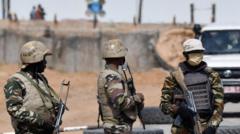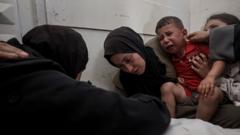The decision marks a significant escalation in the United States' approach to the ongoing violence and governmental instability in Haiti, as armed gangs increasingly control essential economic routes.
Trump Designates Haitian Gangs as Terrorists, Escalating Humanitarian Crisis

Trump Designates Haitian Gangs as Terrorists, Escalating Humanitarian Crisis
The Trump administration's classification of Haitian gangs as terrorist organizations is set to trigger harsh sanctions, deepening the humanitarian distress in Haiti.
In a bold move on Friday, the Trump administration officially classified a coalition of armed gangs in Haiti, known as Viv Ansanm, as a terrorist organization. This designation is aimed at curbing the escalating violence and rampant control over significant economic sectors within the country. As these gangs have expanded their influence, they have taken responsibility for a spate of violent attacks against state institutions and communities across Haiti, exacerbating the ongoing humanitarian crisis.
Viv Ansanm, which translates to "Living Together" in Haitian Creole, initially formed with promises to safeguard local civilians. However, it quickly pivoted to violent tactics, targeting not just civilians but also police forces, hospitals, and prisons. The U.S. government's classification provides a pathway for imposing sweeping economic sanctions on the gang, potentially expanding to military involvement if deemed necessary. Yet, the most concerning aspect of this designation is the broad application it holds — any individuals or businesses deemed to have transactions with Viv Ansanm could face strict penalties from the United States.
Experts warn that the impact could be exceptionally dire, with Jake Johnston of the Center for Economic and Policy Research indicating that such sanctions might effectively halt all trade with Haiti. Nearly all goods entering or leaving the capital, Port-au-Prince, require payments to be made to these gang factions, leaving international aid efforts endangered. Johnston noted, “Humanitarian access programs would also likely cease,” as unimpeded delivery of aid to communities would necessitate negotiations with the gangs, who have a firm grip on transportation routes and economic pathways.
As the situation unfolds, the ramifications of this designation on both the people of Haiti and the future of U.S. foreign policy remain to be seen.




















